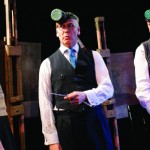The Pitmen Painters
A night out in Bath brings an unexpected bonus as Kate and I visit the  theatre.
theatre.
Into Bath, to the Theatre Royal last night: Last night’s performance was The Pitman Painters.
My heart had sank when I read the pre-performance blurb. The cast -all refugees from such solid BBC series as Byker Grove, Spender and Our Friends In the North– read like Rent-A-Geordie leavened with a couple of regulars from The Bill. The subject sounded uninspiring, too. A bunch of miners in the 1930s took up painting after a series of Art Appreciation Lectures.
What I hadn’t expected was that it would be quite as funny as it was; the rule quoting shop steward who consulted the rulebook at each unexpected situation, such as the artist’s model who arrived expecting to strip off, the Socialist war veteran who quoted Marx at every opportunity, the scally who had a one-liner for every occasion – all of them had us roaring with laughter, the dialogue razor-sharp, the delivery whip-cracking.
There was unexpected pathos as well as one of the miners was offered patronage from an heiress – her offer of £2.50 a week was more than he could earn as a miner for work that was literally back-breaking should a roof collapse. But the group were a collective; what would he do? Should he leave the community that was everything to him, friends, family, companions– and if he did, would he lose the very identity that made his art what it was?
Because this was based on the true story of a group of Durham miners who received unexpected national acclaim amid the poverty of the 1930s, there were no easy answers, and George spent the rest of his life wondering if he had made the right decision.
Written by Lee Hall, who wrote Billy Elliott (which was set in the same area, but 50 years later) the play wore its Old Labour sentiments on its sleeve, depicting a time when many of its protagonists lived in poverty, and the Attlee government’s aspirations were like a call to the New Jerusalem – healthcare for all, an end to poverty, and the dawning of a new democracy. Which made our cynicism-drenched hindsight of the outcomes all the more sad.
Long after the doors had closed, I kept thinking about how much of what we take for granted was denied to these men; we assume that anyone who wants to be a painter now has access to education and opportunities, but to these miners the world of art was closed, which made their achievements even more remarkable.
And the bonus? Because the theatre was empty, we got an upgrade from our £6 at the top of the theatre bench to £30 seats so close to the stage that we could see the cast’s hobnailed boots. 🙂
